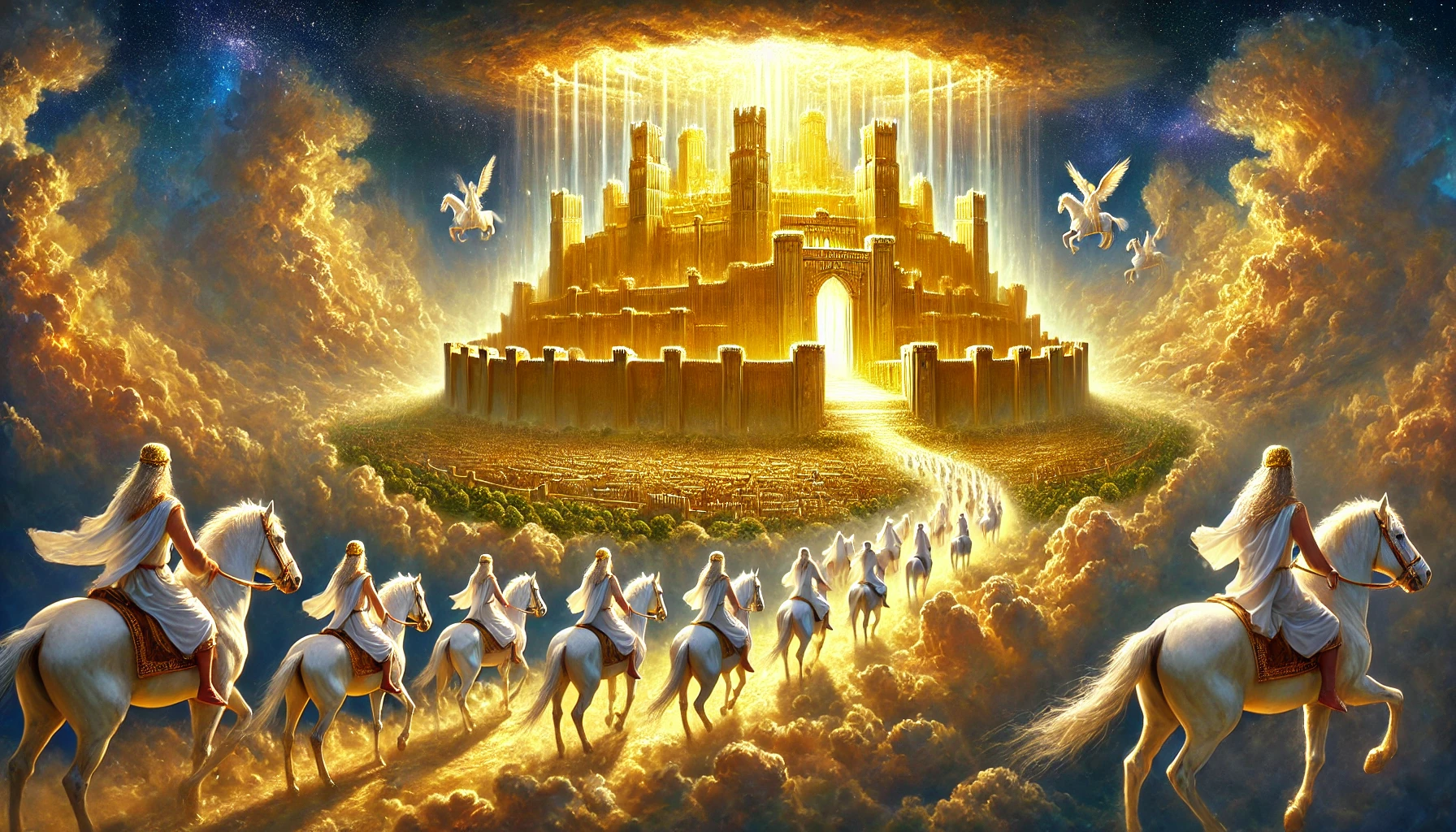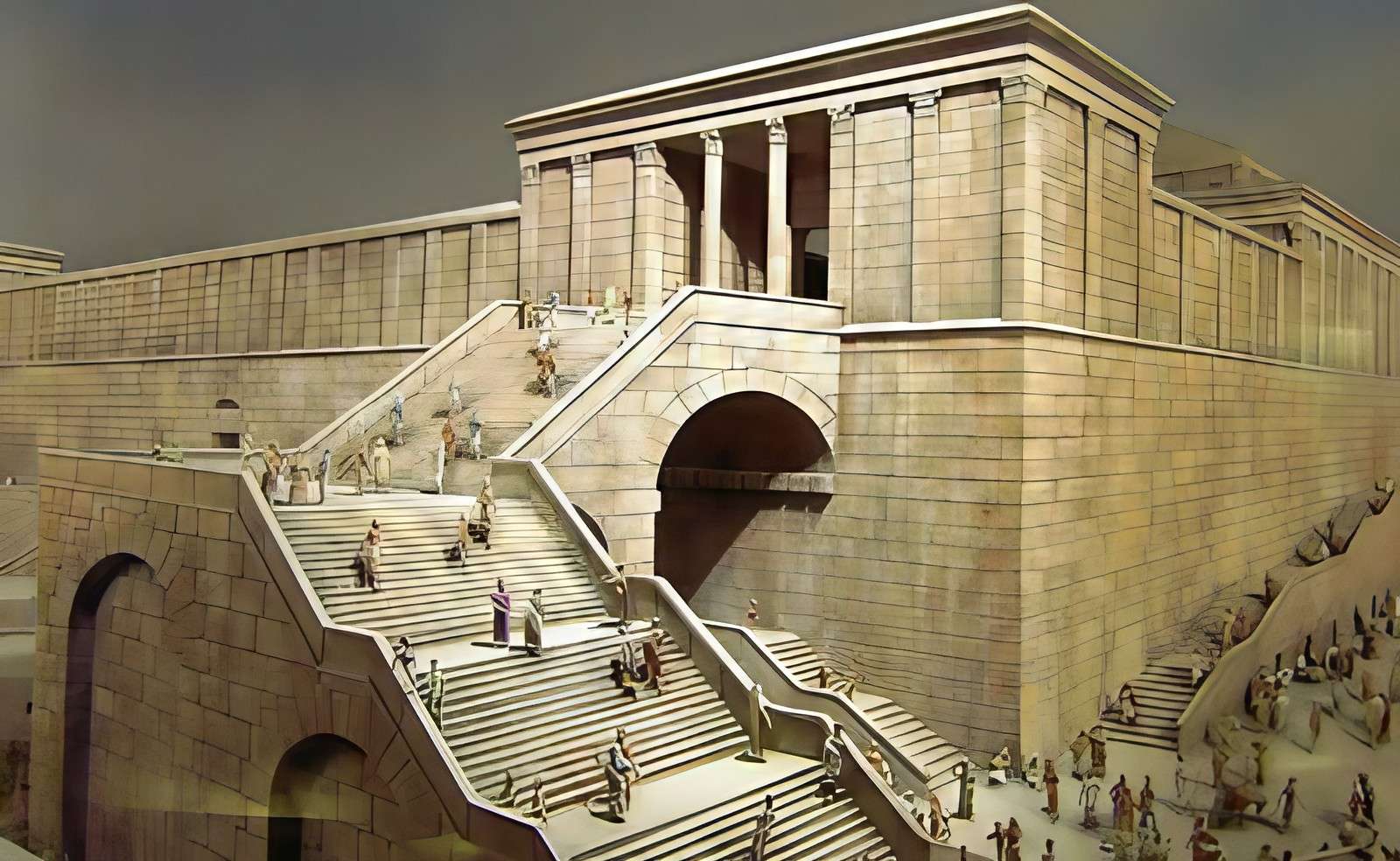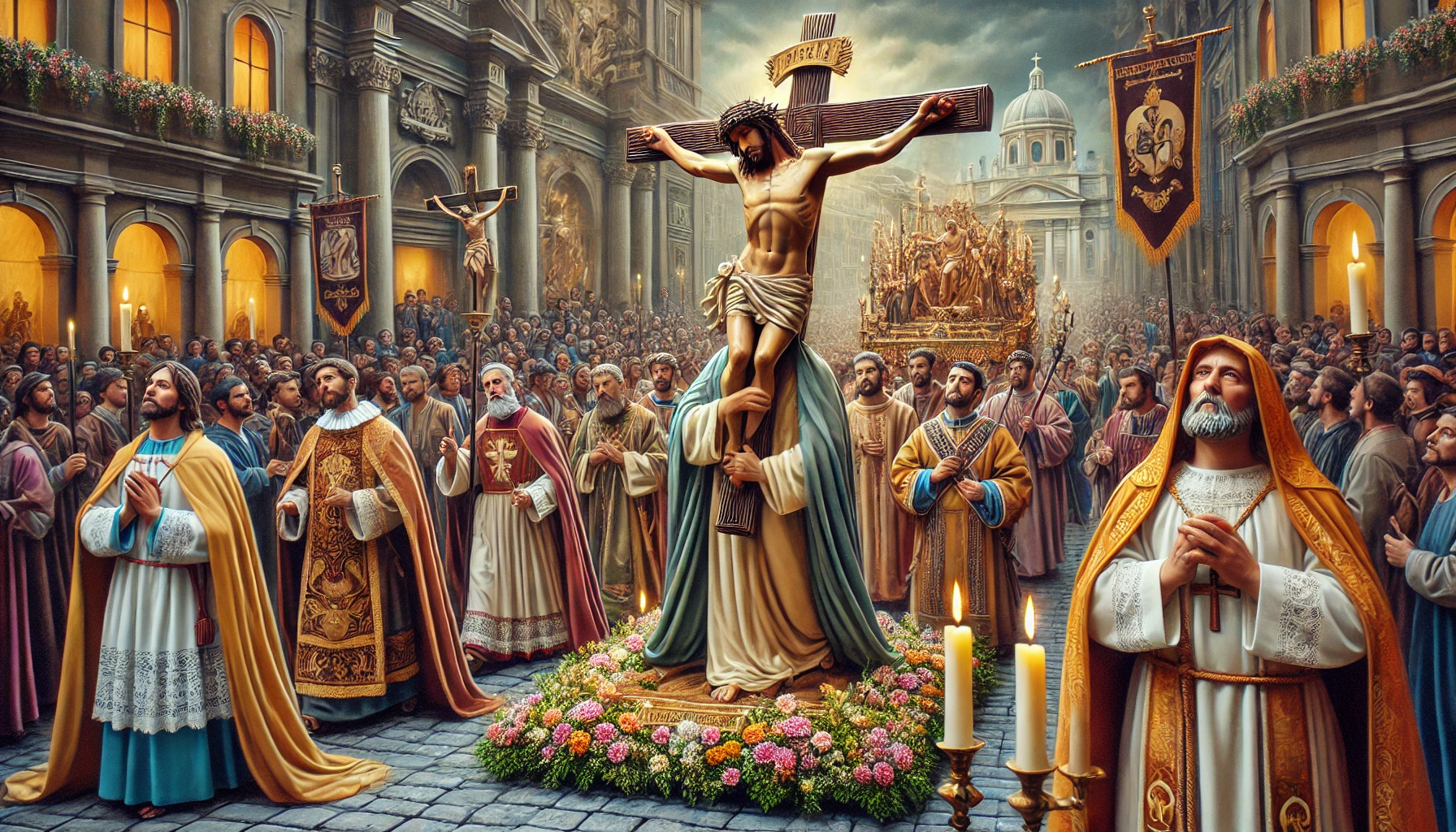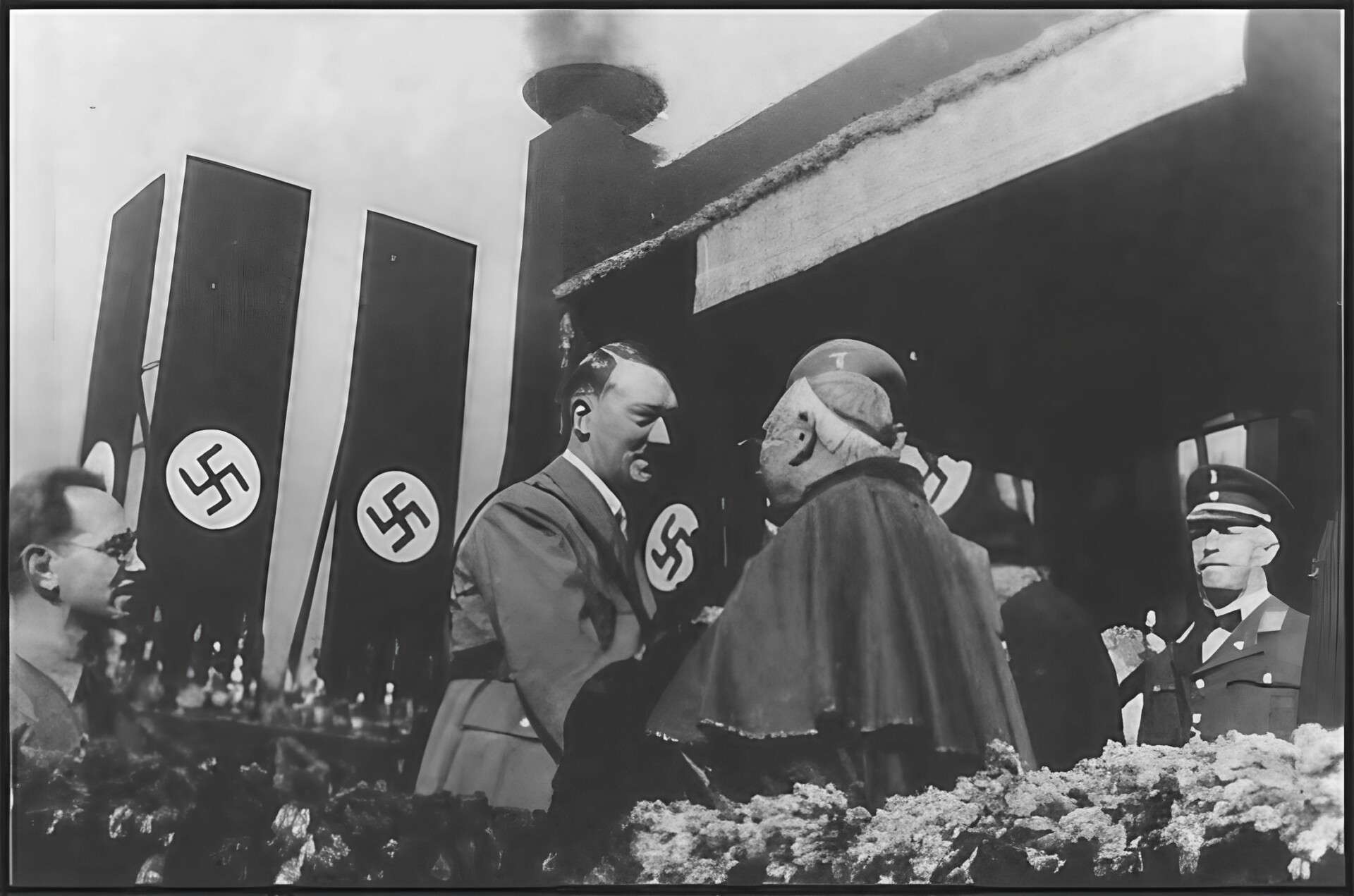When Paul said that we have citizenship in heaven, he was confirming what is mentioned in 1 Peter 2:9. “But you are a chosen people, a royal priesthood, a holy nation, God’s special possession, that you may declare the praises of him who called you out of darkness into his wonderful light.” When Peter wrote this epistle in the year 60 A.D., he was not telling his readers that they were already a nation, or that they were descendants of God, nor that they were royal priests at that time.
Far from being a privileged group for being part of the Kingdom of God, Christians were fugitives of justice for preaching about Jesus. Although they tried to live in communion with society, helping their neighbors, caring for the poor, widows, and orphans, that is to say, despite their altruism and kindness, they were the beginning of a persecution that lasted for 300 years.
By the way, if you want to know how the persecution of Christians started, listen to our study titled the same way.
Belonging to a nation or being part of such a nation does not mean you are living in it. For example, if you were born in a country, say Mexico, you are a Mexican citizen, but due to life’s circumstances, you emigrate to another country, like the United States. You remain Mexican, even though your U.S. passport says you are American. In the same way, we can say that we are part of the Kingdom of God when we are baptized by the Holy Spirit. “And you also were included in Christ when you heard the message of truth, the gospel of your salvation. When you believed, you were marked in him with a seal, the promised Holy Spirit, who is a deposit guaranteeing our inheritance until the redemption of those who are God’s possession—to the praise of his glory.” Ephesians 1:13-14.
The only guarantee we have that we are part of that Kingdom, even though we do not live in it, is that we have been sealed by the Spirit of God.
On one occasion, the Pharisees asked Jesus when the Kingdom of God would come. His answer was confusing; in fact, I believe that was the purpose. Luke 17:20-21 says: “Once, on being asked by the Pharisees when the kingdom of God would come, Jesus replied, ‘The kingdom of God is not something that can be observed, nor will people say, “Here it is,” or “There it is,” because the kingdom of God is in your midst.”
Jesus told them that they would not know when the Kingdom of God would come, but at the same time, He told them that the Kingdom was already present. This warning is a clear allusion to some doctrines that teach that the Kingdom of God is already present in the world. Many think that we, Christians, are God’s representatives on earth; they believe that we are His ambassadors, while others believe we are His princes. They preach that the Kingdom is already on earth but only rules over the believers. When Jesus told the Pharisees that the Kingdom was already among them, it was a way of telling them that the King was already present among them. Jesus used what we call a litote, a rhetorical figure that affirms and denies at the same time in order to soften a statement, which in this case suggested that He was the King of that Kingdom without saying it directly.
According to the Dictionary of the Royal Spanish Academy, the word “Kingdom” means “Territory or province with its inhabitants subject to a king.” It is interesting to note that the same dictionary mentions that the Kingdom of God is “A new state of things in which salvation and God’s will reign. It was announced by the prophets of Israel, preached and established by Jesus Christ. Its fulfillment, incomplete and temporary in the militant church, will be consummated and perpetuated in the triumphant church.”
This definition is correct because Jesus came to crown Himself as the King of the Kingdom of Heaven, and it will be fully established when the triumphant Church completes its journey on earth. For this to happen, the church must be perfected until it reaches the stature of the perfect man.
Jesus was born as a human being, like any other; He was not born in the royal house, nor in the house of someone powerful. His birth, though humble, did not go unnoticed—many people, even outside the borders of Israel, knew that He was going to be born. Herod the First, the governor, found out about this event because wise men or astrologers came from the East to worship Him, and they made it known to him. “Where is the one who has been born king of the Jews? We saw his star when it rose and have come to worship him.” Matthew 2:2
On the other hand, Jesus was not saying that the Kingdom of God was already present on earth literally, because He Himself said in Luke 22:18: “For I tell you I will not drink again from the fruit of the vine until the kingdom of God comes.” Jesus confirmed that the Kingdom was not yet present, but that His heavenly government would take some time to arrive.
The wise men believed the King had been born in the royal house, but the King was born in a manger and grew up amidst poverty, as stated in Luke 6:20. These wise men came to honor the King who had been born, just as today honors are given to a president of any nation. However, Jesus died on a cross without acting as a King, although in apparent mockery, Roman soldiers placed a sign over the cross indicating that He indeed was a King. “They sat down and kept watch over him there. Above his head they placed the written charge against him: THIS IS JESUS, THE KING OF THE JEWS. Two rebels were crucified with him, one on his right and one on his left.” Matthew 27:36-38
Jesus began His ministry by announcing that the Kingdom of Heaven was near. “Repent, for the kingdom of heaven has come near.” Matthew 3:2 (New International Version). He said this because His Kingdom had not yet come. It is evident that Jesus did not act as King but as a subject, serving, rather than being served. But when Jesus triumphed on the cross at Calvary, He was exalted to the highest, being crowned King of Kings and Lord of Lords. When Jesus said that the Kingdom of God was near, it was because some time was still needed for it to be established.
We can compare the Kingdom of Heaven to the way a president of any nation in the world is elected; although the president has been chosen, they do not take office on the same day as their election. Instead, a period of time must pass while the outgoing president informs the new one about the administrative aspects. Similarly, Jesus came to earn the right to take for Himself kings and priests who would rule with Him in the coming Kingdom. Unlike presidents of nations, He will not take power through democratic elections but by force.
No human army will be able to prevent Him. “The armies of heaven were following him, riding on white horses and dressed in fine linen, white and clean. Coming out of his mouth is a sharp sword with which to strike down the nations. ‘He will rule them with an iron scepter.’ He treads the winepress of the fury of the wrath of God Almighty. On his robe and on his thigh he has this name written: KING OF KINGS AND LORD OF LORDS.” Revelation 19:14-16
The book of Isaiah says that Jesus will sit on the throne of David. “Of the greatness of his government and peace there will be no end. He will reign on David’s throne and over his kingdom, establishing and upholding it with justice and righteousness from that time on and forever. The zeal of the Lord Almighty will accomplish this.” Isaiah 9:7. The Kingdom of God will be established on earth the moment Jesus returns as King of Kings in His second coming. Therefore, the “Kingdom” is not an imaginary government ruling the affairs of humanity through the hearts of men, but it will be as real and tangible as any human government.
The Scripture says that He will sit on the Throne of David.
The prophecy of Isaiah was confirmed by the angel who announced to Mary the birth of the Messiah, saying: “Do not be afraid, Mary; you have found favor with God. You will conceive and give birth to a son, and you are to call him JESUS. He will be great and will be called the Son of the Most High. The Lord God will give him the throne of his father David.” Luke 1:30-32
When the Bible says that Jesus will establish Himself on the throne of David, it is referring to the promise that God made to King David in the Old Testament, that one of his descendants would rule forever. This has profound significance for Christians because it connects Jesus with the hope of the promised Messiah who would restore and govern the people of God. God promised King David that his lineage would endure forever and that his descendant would rule eternally. This promise is known as the Davidic Covenant and appears in several passages in the Old Testament, such as in 2 Samuel 7:12-13. “When your days are over and you rest with your ancestors, I will raise up your offspring to succeed you, your own flesh and blood, and I will establish his kingdom. He is the one who will build a house for my Name, and I will establish the throne of his kingdom forever.”
This promised descendant would be a king who would rule not only Israel but the whole world, and whose kingdom would have no end. Christians believe that Jesus is the fulfillment of this promise, meaning He is the descendant of David who would rule forever. In the New Testament, Jesus is repeatedly presented as the Son of David, meaning that He is the rightful heir to the throne of David. For example, in Luke 1:32-33, the angel Gabriel tells Mary about Jesus. “He will be great and will be called the Son of the Most High. The Lord God will give him the throne of his father David, and he will reign over Jacob’s descendants forever; his kingdom will never end.”
Although the promise of a throne suggests a physical government, for a long time, some influential Christians believed that Jesus ruled from His spiritual kingdom in the heavens. In this sense, it is not about an earthly throne limited to Israel, but a Kingdom that encompasses the entire world and all creation. The idea that God rules through the hearts of believers is not new. Since the early days of Christianity, when the true doctrines of Christ began to decline, voices emerged suggesting that the Kingdom of God was established in the hearts of believers, and from there, God could guide His people to walk in righteousness.
One of the first and most influential theologians of the Church, Saint Augustine of Hippo (354-430 A.D.), in his work “The City of God”, described the distinction between the City of God, which represents the spiritual Kingdom of Christians, and the City of Man, which represents the earthly world. According to Augustine, the Kingdom of God is not an earthly kingdom but the spiritual community of the faithful, who will live in fullness for eternity. He argues in his work “The City of God” that the Kingdom of God is not tied to any earthly empire or kingdom but is the reign of Christ in the hearts of believers and will be fully realized in eternity.
The reformer Martin Luther (1483-1546 A.D.) also preached about the Kingdom of God as a spiritual kingdom. Luther taught that the Kingdom of God is established in the lives of Christians through faith in Jesus Christ. For Luther, the kingdom was not earthly or political, but consisted of the relationship between God and believers through the gospel and justification by faith. Luther spoke of the “Kingdom of the right hand of God,” referring to His spiritual kingdom, in contrast to the “Kingdom of the left hand,” which represented earthly government.
Another influential figure was John Calvin (1509-1564), who emphasized the spiritual nature of the Kingdom of God. In his work, “Institutes of the Christian Religion”, Calvin explained that the Kingdom of God was manifested in the lives of Christians through their faith and obedience to God’s Word, rather than through political or physical structures. In his book, “Institutes of the Christian Religion,” Calvin expounds that the Kingdom of God is a kingdom of grace and justice, which begins in the hearts of the faithful and will be consummated in eternity.
The famous English Baptist preacher of the nineteenth century, Charles Spurgeon (1834-1892), also spoke of the Kingdom of God as a spiritual kingdom. He preached that the Kingdom of God begins with the inner transformation of the believer through repentance and faith, and not through a change in earthly power. For him, the true work of the Kingdom was to bring people into a relationship with Christ. He stated, “The Kingdom of God is not a political kingdom. It is a spiritual kingdom where Christ reigns in the hearts of men.”
Another prominent preacher was George Eldon Ladd, a twentieth-century theologian (1911-1982). George Eldon Ladd was a key advocate of the understanding of the Kingdom of God as both a present and future reality. He was a distinguished evangelical theologian and professor at Fuller Theological Seminary in Pasadena, California, known especially for his approach to the Kingdom of God. Ladd played a key role in twentieth-century evangelical theology by defending a biblical understanding of the Kingdom of God as both a present and future reality, often referred to as the “already but not yet” perspective of the Kingdom.
Ladd taught that the Kingdom of God is already present among believers through the work of Christ and the Holy Spirit, but will be fully realized when Christ returns. In his work, “The Gospel of the Kingdom”, he teaches that the Kingdom of God is a spiritual reality experienced now, but its total manifestation will be seen in the future with Christ’s return.
Believing in a Heavenly Kingdom on earth is too much.
While it is true that Christians believe that Jesus already reigns from heaven, they expect His Kingdom to be fully manifested on earth when He returns. For now, they believe that Christ rules in the hearts of Christians. Few think that this Kingdom is something literal, but rather it remains in theological terms as a doctrine, or at least as the collective conviction that all Christians share the same authority, but in no way a literal government.
Jesus clarified that His Kingdom was not of this world; He did not belong to the political system of men, nor did He share their form of government or their laws, which is why He did not act according to them. On the contrary, He acted as a foreigner in His own land, submitting to human authorities, as John 19:11 states. “Jesus answered, ‘You would have no power over me if it were not given to you from above. Therefore the one who handed me over to you is guilty of a greater sin.’” Jesus makes it clear to Pilate that the power he has is neither absolute nor comes from himself. He points out that the authority Pilate exercises has been given to him “from above”, meaning by God. This is a reminder of God’s sovereignty over all earthly matters, including human authorities. Jesus affirms that, although Pilate has political power at that moment, the absolute power belongs to God.
Paul teaches that all human authority, whether civil, political, or of any other kind, has been allowed and established by God. This means that God has established a system of authority so that men can govern themselves and there can be control over all structures of power, without anything happening outside of His sovereign will. “Let everyone be subject to the governing authorities, for there is no authority except that which God has established. The authorities that exist have been established by God. Consequently, whoever rebels against the authority is rebelling against what God has instituted, and those who do so will bring judgment on themselves.” Romans 13:1-2
God has established this system of self-government for the nations so that there can be peaceful and civilized coexistence. This does not mean that God decides who will win the elections in a particular country; it is humans who make that decision. When we go to the polls, we decide who will govern us for better or for worse. The decision of who will be our highest civil authority is our responsibility, just as the people of Israel decided they wanted a king instead of being guided by God. 1 Samuel 8:4-5
It would be correct to say that human authorities in general have been delegated or allowed by God, in such a way that He delegates to humans the responsibility to govern themselves, establishing government structures to maintain order, justice, and social welfare. From this perspective, we can say that humans, being created in the image of God, have the capacity and responsibility to exercise authority and dominion over creation, including systems of government. However, this self-government takes place under God’s sovereignty, recognizing that all human power is derived and temporary. Leaders do not have absolute or independent power from God.
In God’s design, the purpose of human government is to help people live in society justly, establishing order and protecting the most vulnerable. A human government, when just, can allow people to govern themselves in the sense that laws and structures enable an orderly and peaceful life. In this sense, it could be said that authorities establish the framework for individuals and communities to live in peace, follow laws, and self-govern under just principles. Thus, human governments are a reflection of the need for order and justice in a fallen society. If humans lived completely under the law of God, the concept of civil authority as we know it could be very different.
When they brought Jesus before Pontius Pilate, the religious leaders accused Him primarily of three things. Although the reasons for His arrest were religious, the Jewish leaders adapted their accusations to make them appear more politically relevant before Pilate. These accusations were:
1- Inciting rebellion. They accused Him of subverting the people and causing disturbances among the Jews. In Luke 23:2 it says: “We have found this man subverting our nation.” This accusation implies that Jesus was a threat to the stability of the Roman Empire, as inciting the people to rebellion would be seen as a serious crime by the Romans.
2- Prohibiting the payment of tribute to Caesar. In the same passage of Luke 23:2, the leaders say that Jesus was prohibiting paying taxes to Caesar. This accusation is false, as Jesus had explicitly said in Matthew 22:21: “Give back to Caesar what is Caesar’s, and to God what is God’s.” However, this was a strategic accusation because the Romans considered the collection of taxes to be extremely important, and opposing it was seen as a serious offense.
3- Declaring Himself king. The most serious accusation was that Jesus proclaimed Himself king, which implied possible treason or a challenge to the authority of the Roman emperor. The Jewish leaders said in Luke 23:2: “He claims to be the Messiah, a king.” This accusation was intended to make Pilate see Him as a rebel presenting Himself as a rival to Caesar, which would be considered a crime of treason, since in the Roman Empire, only the emperor could be considered king.
In this context, Jesus is presented before Pontius Pilate to be accused of all these crimes, even though He was innocent of what they accused Him of. In John 18:36, we find: “My kingdom is not of this world. If my kingdom were of this world, my servants would fight to prevent my arrest by the Jewish leaders. But now my kingdom is from another place.”
When Jesus said that His Kingdom was not of this world, He was affirming that His kingdom was not an earthly kingdom, like the ones we know today. His kingdom is not based on political power, the balance of powers, or the use of weapons to subdue other nations. His authority is total, it is supernatural; it is a Theocracy in the strict sense of the word. The difference is radical compared to the governments of the earth.
Jesus points out that if His kingdom were of this world, His followers would have fought to prevent His arrest, meaning His angels would have prevented His king from being mistreated by inferior beings. This implies that His authority on the human plane was limited to the mission assigned to Him by the Father. He did not come to impose Himself or defend Himself; instead of seeking power through violence, His purpose was based on truth, justice, and love. “He was oppressed and afflicted, yet he did not open his mouth; he was led like a lamb to the slaughter, and as a sheep before its shearers is silent, so he did not open his mouth.” Isaiah 53:7
What is the significance of God establishing His Kingdom around the figure of David?
It definitely has great significance, since the throne of David was founded on justice, righteousness, and goodness—virtues that characterized David. If we examine David’s virtues, we will realize that they largely represent the model of Jesus, the difference being that Jesus did not exercise His role as King, while David did so for forty years. The Lord sought a king according to His heart, a man who thought and acted based on the longing of his heart. A merciful, kind, and just heart. “But now your kingdom will not endure; the Lord has sought out a man after his own heart and appointed him ruler of his people, because you have not kept the Lord’s command.” 1 Samuel 13:14
David was a brave man who fully trusted in God and not in his own strength. “David said to the Philistine, ‘You come against me with sword and spear and javelin, but I come against you in the name of the Lord Almighty, the God of the armies of Israel, whom you have defied.’” 1 Samuel 17:45 Although David possessed supernatural strength, he defeated a giant who was stronger and much more experienced in matters of war than he was. This giant would have intimidated the bravest men of Israel; contrary to popular belief, David was capable of killing a bear or a lion with his own hands, which implies a strength greater than that of any ordinary man.
“Saul said to David, ‘You are not able to go out against this Philistine and fight him; you are only a young man, and he has been a warrior from his youth.’ David said to Saul, ‘Your servant has been keeping his father’s sheep. When a lion or a bear came and carried off a sheep from the flock, I went after it, struck it and rescued the sheep from its mouth. When it turned on me, I seized it by its hair, struck it and killed it.’” 1 Samuel 17:33-35
Who said that David was a handsome, weak young man? Contrary to popular belief, David was a very strong man, possibly with supernatural strength, but he did not trust in his own abilities; instead, he placed all his trust in the Lord, his protector and Savior. “This day the Lord will deliver you into my hands, and I will strike you down and cut off your head. This very day I will give the carcasses of the Philistine army to the birds and the wild animals, and the whole world will know that there is a God in Israel.” 1 Samuel 17:46
David was a man who walked in integrity. “Vindicate me, Lord, for I have led a blameless life; I have trusted in the Lord and have not faltered. Test me, Lord, and try me, examine my heart and my mind; for I have always been mindful of your unfailing love and have lived in reliance on your faithfulness.” Psalm 26:1-3 Would you be able to pray a prayer like this to God?
David was a man of pure lips who did not lie or deceive anyone, except in the matter of Uriah the Hittite. David was a righteous man in the eyes of God. “Hear me, Lord, my plea is just; listen to my cry. Hear my prayer, it does not rise from deceitful lips. Let my vindication come from you; may your eyes see what is right. Though you probe my heart and examine it at night, though you test me, you will find that I have planned no evil; my mouth has not transgressed.” Psalm 17:1-3 Are there Christians like David today? Or are there any politicians or rulers with these characteristics?
The virtues that characterized David’s government will be established in the Kingdom of God on earth. Jesus will rule with justice and equity over all men forever, but He will also punish the wicked and the sinners. “He will delight in the fear of the Lord. He will not judge by what he sees with his eyes, or decide by what he hears with his ears; but with righteousness he will judge the needy, with justice he will give decisions for the poor of the earth. He will strike the earth with the rod of his mouth; with the breath of his lips he will slay the wicked. Righteousness will be his belt and faithfulness the sash around his waist.” Isaiah 11:3-5
Structure of the Kingdom of God
The Kingdom of God has characteristics similar to those of a human kingdom or government, in the sense of having an organization that serves to administer the nation, where the king is the highest authority. After the King, or President of the Republic, governors of provinces or states are elected, and there are also mayors in the towns. Government servants are also hired to handle the affairs of state administration, and lastly, the general population.
Now, in the Kingdom of God, there are places of privilege that God will give to the overcomers. If you would like to learn more about the subject of the overcomers, I invite you to watch our study titled: “Will We All Be Kings and Priests?”
Jesus told His disciples that they would rule over each of the twelve tribes of Israel. “Jesus said to them, ‘Truly I tell you, at the renewal of all things, when the Son of Man sits on his glorious throne, you who have followed me will also sit on twelve thrones, judging the twelve tribes of Israel.’” Matthew 19:28
The promise of ruling over the nations was not only for the disciples but for all the overcomers who keep His commandments. “To the one who is victorious and does my will to the end, I will give authority over the nations— that one ‘will rule them with an iron scepter and will dash them to pieces like pottery’—just as I have received authority from my Father.” Revelation 2:26-27
We cannot be certain about who will make up the Kingdom of God, because that choice belongs only to God. Some disciples, like John and James, wanted to sit next to Jesus when His kingdom was established; however, He told them that the decision was up to the Father.
“Then James and John, the sons of Zebedee, came to him. ‘Teacher,’ they said, ‘we want you to do for us whatever we ask.’ ‘What do you want me to do for you?’ he asked. They replied, ‘Let one of us sit at your right and the other at your left in your glory.’ Jesus replied, ‘You don’t know what you are asking. Can you drink the cup I drink or be baptized with the baptism I am baptized with?’ ‘We can,’ they answered. Jesus said to them, ‘You will drink the cup I drink and be baptized with the baptism I am baptized with, but to sit at my right or left is not for me to grant. These places belong to those for whom they have been prepared.’” Mark 10:35-39
Today, there is very little expectation regarding the establishment of the Kingdom of God on earth. In fact, the vast majority of Christians think that their journey will culminate when they die or when the “Rapture” takes place. However, for the disciples, it was different. Their hope and faith were based on the promise Jesus made, which He would fulfill upon His return.
They believed that Jesus would return in their time, and for this reason, they encouraged one another to not lose heart and to keep going. “Be patient then, brothers and sisters, until the Lord’s coming. See how the farmer waits for the land to yield its valuable crop, patiently waiting for the autumn and spring rains. You too, be patient and stand firm, because the Lord’s coming is near.” James 5:7-8
Each of them desired to be with Jesus at His return. They understood that participating in the Kingdom of God was far more valuable than any earthly possession, which is why they were willing to give up everything to follow Jesus.
Peter, being the most daring of the disciples, asked Jesus what they would receive after leaving their possessions to follow Him. “Peter answered him, ‘We have left everything to follow you! What then will there be for us?’” Matthew 19:27 What good is leaving everything if you receive nothing in return?
They literally gave up everything, not figuratively. They fully understood the commandments of Christ. They did not misinterpret the Scriptures; they received Jesus’ instructions directly from His mouth. Remember, they spent three and a half years with Jesus every day. Do you think they didn’t understand what He taught them?
All the good works that the disciples did will be rewarded in the Kingdom of God, and the same goes for us. The gospel of the Kingdom has not changed; all the commandments, demands, and rewards are still valid. Therefore, any work we do for God’s servants will be rewarded.
“Anyone who welcomes you welcomes me, and anyone who welcomes me welcomes the one who sent me. Whoever welcomes a prophet as a prophet will receive a prophet’s reward, and whoever welcomes a righteous person as a righteous person will receive a righteous person’s reward. And if anyone gives even a cup of cold water to one of these little ones who is my disciple, truly I tell you, that person will certainly not lose their reward.” Matthew 10:40-42
When will the Kingdom be established?
The Scripture says: “Your kingdom come, your will be done, on earth as it is in heaven.” Matthew 6:10 This part of the prayer, where Jesus teaches His apostles how to pray to the Father, tells us to ask that God’s will be done on earth as it is in heaven. This implies that we on earth should submit to God’s direct authority, which, evidently, is not happening. Unfortunately, we see the opposite. Men do what they think is right, and generally, it is a disaster.
Why do we say this? Because it is not the will of God for laws to be approved that allow the marriage of homosexuals. It is also not the will of God for wealthy countries to throw tons of food into the sea to maintain market prices while millions of people have nothing to eat. It is not the will of God for powerful countries to invade others to take control of their natural resources. Even less is it the will of God for the increase of sexual depravity and child pornography. All these things go against the will of God. Or do you think these things are allowed in heaven?
So, when will God’s will be done on earth? … Is it when all men convert to Christianity? … Or when all politicians are Christians? In no way will God’s will be done until Jesus Christ returns and establishes His Kingdom on earth. That prayer is to ask God to come and govern us directly, as He once did. It is to ask God to return and completely eliminate all the wicked because only the righteous will inherit the earth.
God’s will is done in heaven, where His Kingdom is today. In His Kingdom, His angels perfectly fulfill His commandments, and likewise, it will be done over all the nations of the earth when Jesus Christ returns to establish His heavenly government.
When will this happen? It will be when the Father has placed Christ’s enemies as a footstool under His feet. Acts 2:34. Who are these enemies? … Where are they? … The prophet Isaiah gives us a view of who they are and where they are.
“How the faithful city has become a prostitute! She once was full of justice; righteousness used to dwell in her— but now murderers! Your silver has become dross, your choice wine is diluted with water. Your rulers are rebels, partners with thieves; they all love bribes and chase after gifts. They do not bring justice to the fatherless, and the widow’s case does not come before them. Therefore the Lord, the Lord Almighty, the Mighty One of Israel, declares: ‘Ah, I will get relief from my foes and avenge myself on my enemies. I will turn my hand against you; I will thoroughly purge away your dross and remove all your impurities. I will restore your leaders as in the days of old, your rulers as at the beginning. Afterward you will be called the City of Righteousness, the Faithful City. Zion will be delivered with justice, her penitent ones with righteousness. But rebels and sinners will both be broken, and those who forsake the Lord will perish.’” Isaiah 1:21-28
God’s enemies are those who, even though they are members of some denomination, do not help the needy, do not give water to the thirsty, and do not assist widows and orphans. They are those who turn away from the truth and pursue lies and doctrinal “trends” that lead believers to perdition. Paul warns us that many Christians become enemies of the cross of Christ when they reject the privilege of suffering for Jesus, when they take lightly the commandments of the Lord, and when they allow others to deceive them. “Brothers and sisters, join together in following my example, and take note of those who live according to the pattern we gave you. For, as I have often told you before and now tell you again even with tears, many live as enemies of the cross of Christ. Their destiny is destruction, their god is their stomach, and their glory is in their shame. Their mind is set on earthly things.” Philippians 3:17-19
God the Father will humble all the proud and place them before Jesus so that, with all authority, both men and angels will be judged in His presence. We do not know when Jesus will return, so we cannot know the exact date when the Kingdom of God will be established on earth. What we do know is that from the moment Jesus returns to earth, all the nations of the world will be under His dominion.
“John, to the seven churches in Asia: Grace and peace to you from him who is, and who was, and who is to come, and from the seven spirits before his throne, and from Jesus Christ, who is the faithful witness, the firstborn from the dead, and the ruler of the kings of the earth. To him who loves us and has freed us from our sins by his blood, and has made us to be a kingdom and priests to serve his God and Father—to him be glory and power for ever and ever! Amen.” Revelation 1:4-6
Announcing the Kingdom of God
When Lord Jesus Christ was with the disciples, He taught them to ask the Father for His Kingdom to be established on earth. Matthew 6:10. And He sent them to announce that the Kingdom of God was near. “As you go, proclaim this message: ‘The kingdom of heaven has come near.’” Matthew 10:7. This was the central message of Jesus’ preaching. Therefore, it is necessary that the gospel of the Kingdom be preached again as a testimony to the nations before the end comes and destroys them.
Jesus was sent precisely to announce the Kingdom of Heaven; that was the core of His preaching. It was not about winning souls to fill congregations and increase money collections. The apostles wanted to make disciples so they would understand these things and put the commandments of the Lord into practice. Acts 8:12 says, “But when they believed Philip as he proclaimed the good news of the kingdom of God and the name of Jesus Christ, they were baptized, both men and women.”
The believers of the first century were convinced and persuaded that the Kingdom of God would come to earth. They all died with that hope. That is why they confidently announced that the Kingdom of God would be established on earth. They were convinced and persuaded that the Kingdom was something real and tangible; they never considered it something ethereal or a mere feeling. “Paul entered the synagogue and spoke boldly there for three months, arguing persuasively about the kingdom of God.” Acts 19:8
Christians like Paul preached their whole lives about the Kingdom of God, and their goal was for ordinary people to have the opportunity to participate in that Kingdom on earth. “For two whole years Paul stayed there in his own rented house and welcomed all who came to see him. He proclaimed the kingdom of God and taught about the Lord Jesus Christ—with all boldness and without hindrance.” Acts 28:30-31
As Lord Jesus Christ rightly said, to enter the kingdom of heaven, one must be like children. They do not doubt; they just believe when their father tells them something. If their dad says that the tooth fairy will leave a dollar under their pillow, they believe it without question. “Truly I tell you, unless you change and become like little children, you will never enter the kingdom of heaven. Therefore, whoever takes the lowly position of this child is the greatest in the kingdom of heaven.” Matthew 18:3-4
We must proclaim the Kingdom of Heaven and the name of Jesus Christ to all creatures, just as His disciples did. We must follow the example of the apostles, not that of certain denominations. I know that if you have been part of a congregation for many years, it will be difficult to explain that the Kingdom of God is something literal. There will be many opposing voices who will tell you that the Kingdom of Heaven is not literal but spiritual. You must understand that they, like you, were taught in this way.
Now, Jesus Christ told His apostles to go into all the world, making disciples and baptizing them in the name of the Father, the Son, and the Holy Spirit. He told them to teach others to obey everything He had commanded them.
The question is: Are we teaching people to expect God’s new government on earth? Do we tell the new believer that Christ will physically return to judge the living and the dead, including the Evangelical Christian? Do we teach them not to focus on material things, because all the works on earth will be burned? Do we teach the new believer that we must obey Christ’s commandments in order to attain salvation?
If we are not doing this, it is time that we start, because Jesus is coming soon, and it is necessary for us to return to the doctrines of Christ rather than those defended by each denomination. It is sad to see that the true teachings of Christ have been lost over time and have been replaced by a mix of humanism and Christianity, and even some outright heresies.
We must emphasize that the Kingdom of God is a real and tangible government that will directly intervene in the affairs of men from the moment it is established. It is not a fantasy or a story of ignorant people. It is about announcing to the world that Christ is coming soon, and that He will do His will on earth when His Kingdom comes. Therefore, it is essential that we learn to know His will and act according to it.
![]()








